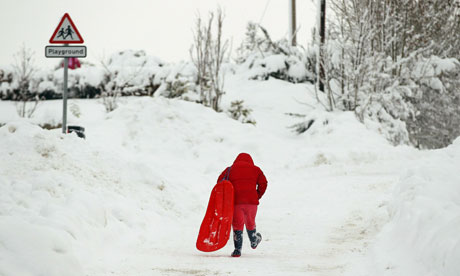
Fresh snowstorms are expected to continue for at least two more days across much of the United Kingdom, after 24 hours which saw falls in almost every part of the country.
Strengthening northeasterly winds have taken the national average temperature to –1C (30.2F), lower than Reykjavik in Iceland and parts of Greenland. These are expected to trigger a further week of cold weather payments to four million households.
For the first time in the current chill, the worst in November for 17 years, snow today reached London and England's most southerly counties. Roads, trains and airports including Heathrow and Gatwick were all seriously disrupted.
Trains were cancelled on Scotrail, the East Coast main line and four other operators, while delays and cancellations spread to Eurostar, on which there was upheaval during the cold snap last winter. Although the brunt of the weather continued to hit the eastern half of the country, temperatures plummeted on the west coast, too.
Workers at the Sellafield nuclear reprocessing plant in Cumbria abandoned their cars and walked home after hours of traffic jams. Just inland, Cockermouth mountain rescue yesterday evacuated 19 people from Gillerthwaite youth hostel below the Lake District fells of Pillar and Steeple. Those rescued included an 80-year-old and two babies.
Barry Gromett, a forecaster with the Met Office, said that arctic winds from northern Russia would sweep in, with wind-chill lowering the –1C (30.2) temperature by another 6C (19.4F).
He said: "The nonstop onslaught of snow in some areas will be back on Wednesday in the north of England and the central parts of Scotland.
"Next week, we'll see a north-south divide, with Scotland still freezing and the south seeing milder conditions." Police were praised for rescuing a heart surgeon on his way to an operating theatre after he spent two hours stuck in traffic in south London because of the snow.
Aziz Anjum flagged down a patrol car which using its klaxon and lights got him to St Helier hospital, Sutton, in seven minutes, just in time to carry out a life-saving operation. Samantha Jones, chief executive of Epsom and St Helier University Hospitals NHS Trust, said: "It's at times like this that the absolute dedication of the emergency services and healthcare professionals shines through."
The A9 between Perth and Dunblane in Scotland reopened after a spell of notoriety as the longest-closed major route during the current snow. Other good news came from the Scottish Environment Protection Agency.
It said that continuing low temperatures were expected to be followed by only a very gradual thaw, reducing the serious risk of flooding that is high if the snowfall – totalling more than 0.6m (2ft) in some upland areas – melts quickly.

